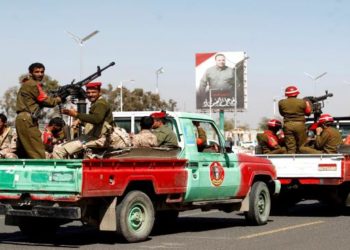
The Yemeni Houthi group has bombed the Saudi capital, Riyadh, and other targets inside the Kingdom, amid remarkable Saudi media silence over the incident while the group announced carrying out wide military operation.
A witness heard two explosions and saw smoke in the Riyadh sky early Tuesday morning, Reuters news agency reported.
Colonel Turki al-Maliki, Arab coalition spokesman, said that the Houthi rebels targeted the Kingdom on Monday evening and Tuesday morning with eight drones and three ballistic missiles.
The Houthi attacks targeted Riyadh, Najran, and Jizan, south of the Kingdom.
Al Masirah, TV channel belongs to the Houthis, announced that fighters had carried out a large-scale military operation in deep inside Saudi Arabia.
The channel announced that the Houthi military spokesman will issue a statement in the coming hours to reveal the details of the attack.
The conflict in Yemen intensified by the end of May, after the end of a six-week ceasefire in the light of the Coronavirus pandemic.
During the past months, the Houthi group bombed multiple targets inside the Kingdom.
Since March 2015, the Saudi-led Arab military alliance have been supporting government forces against the Houthi rebels, in a war that has led to the worst humanitarian in the world, according to the United Nations.
Yemen became divided into areas under the control of internationally recognized legitimate government in the south and areas under the control of the Houthi rebels in the north.
The French newspaper “Le Monde” said that the Saudi ruling regime is searching for an honorable exit from the Yemen conflict, but the political and military map of the country makes it impossible.
The newspaper said that the Houthi group that controls the capital Sanaa, and continues its attacks, is ignoring northern Yemen, while tension escalates in south around the temporary capital, Aden, after the UAE-backed Southern Transitional Council announced self-administration in the city in late April.
Not only the Arab coalition has not succeeded in achieving any of its declared goals since the start of the war, most prominently, restoring the legitimate government after the coup carried out by the Houthis in September 2014, it did not maintain its own cohesion.
In a recent report, Amnesty International said that there are no signs that the war in Yemen will decline as it enters its sixth year. Civilians from all parts of the country continue to bear the brunt of the military hostilities and illegal practices of both state and non-state armed groups.
The United Nations High Commissioner for Human Rights Office has documented the killing and wounding of more than 200,000 civilians since the war began while nearly 16 million people have no food security.
The UAE has tightened its control of Yemen’s ports by supporting its armed militias, with the aim of strengthening Dubai’s ports on the account of weakening the economy of Yemen.
Similarly, Saudi intends to control Yemen’s oil. Yemeni activist Jalal Al-Salahi revealed that the Saudi government imposed an exclusive contract granting it the right to extract oil from Marib and Al-Jawf for 70 years, for only $15 billion.